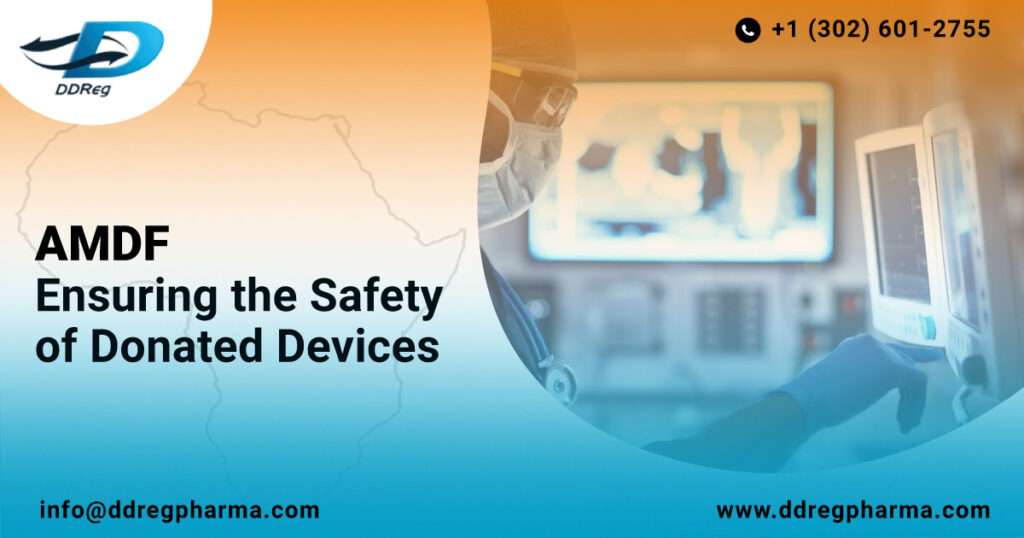In times of emergencies like war, disease outbreak, natural disasters etc that lead to a rise in casualties, humanitarian support such as donations may be required. These donations can range from basic items like clothing to more technical complex items such as medical devices. While donations can be crucial during emergencies, they also bring challenges such as expired or undocumented products, lack of evidence for safety and quality and pressure to accept all donations.
The Africa Medical Devices Forum (AMDF) has developed a guidance document- Guidance on Assessment of Medical Devices Including Diagnostic Tests Donations for In-country Use During Emergencies– to support National Regulatory Authorities (NRAs) in evaluating the quality, safety and effectiveness of donated Medical devices and in vitro diagnostics during times of crisis, like the Covid-19 pandemic. The purpose of this guidance is to aid regulators in making informed decisions on which donated products are suitable for use during emergencies with a specific focus on addressing the unique challenges associated with in vitro diagnostics where existing policy guidelines are currently lacking
General Principles
The AMDF guidance underscores principles associated with donated medical devices (particularly in vitro diagnostics, IVDs) that must be considered:
Benefitting the Recipient: Donated medical devices should maximize benefits for the recipient.
Respecting Recipients Preferences: It is essential to respect the wishes and authority of the recipient.
Ensuring Quality and Safety: There should be no compromise when it comes to maintaining standards of quality, safety and performance- double standards are not acceptable.
Communication: Establishing communication between donors and recipients is critical, throughout the donation process.
- It is important to provide handling instructions, information on the supply chain processes and clear instructions for using IVDs.
- Before accepting a donation for IVDs that require an instrument it is crucial to ensure the availability of that instrument.
- Donated medical devices should come from known sources to maintain traceability.
- When it comes to donated kits or reagents, they should have two-thirds of their prescribed shelf life remaining.
- Used medical equipment should undergo reconditioning, testing and be equipped with all parts, accessories and supporting documents. This ensures that the equipment is in working condition.
- Electrical equipment needs to be set according to voltage specifications. X-ray emitting equipment must be. Inspected by personnel. Evidence of certification must be provided.
- Donated medical devices should be sturdy, fully functional and meet safety and performance standards as defined by the manufacturer.
- All information on labels, user manuals and other accompanying documents should be provided in a language understood by the recipient country.
- Expired or damaged medical devices without parts or support from the manufacturer should not be accepted. If expired devices are received they must be returned at the donor’s expense.
Quality Assurance
The guidelines emphasise factors to consider with respect to the quality of donated medical devices:
Providing Information: Essential information regarding devices can be included on the device itself, its packaging, an accompanying insert or, through printed documents or other appropriate means.
User Guide: Each donated medical device should come with a user guide that contains instructions on how to handle, install, operate, maintain, troubleshoot and important safety precautions and information.
Verification of Performance: IVD devices must undergo verification studies at the National reference laboratory. These studies should adhere to standards such as those set by Clinical Laboratory Standard International (CLSI). They should utilise samples and reference methods. Additionally regular participation in external quality assessment schemes and implementation of internal quality controls during testing are necessary. Ongoing monitoring of device performance through market surveillance is also crucial.
Acceptance Criteria: Recipient countries ought to establish acceptance criteria for donated medical devices based on their existing donation policies and the considerations outlined in the document. These criteria should be risk based.
Reporting: It is mandatory for recipients to report any defects, adverse effects, issues regarding quality or safety, as other cases related to the donated medical devices during their use promptly to the relevant authorities.
National Pharmacovigilance System
The National Pharmacovigilance System, which was established in June 2009 and is managed by the Ministry of Health plays a role. It consists of a reporting system that allows both electronic and manual reporting, through forms. Additionally, there is a database called Pharmacovigilance Electronic Reporting Systems (PvERS). This system involves stakeholders such as healthcare providers from private NGO/mission sectors, public health programs, pharmaceutical industry representatives, marketing authorization holders and collaboration with other departments within the Ministry.
To measure its performance and progress over time the system utilizes a set of indicators. These indicators cover aspects related to health systems and services including inputs, processes, outcomes, outputs and impacts. Core indicators are particularly important for assessing the effectiveness of the pharmacovigilance system as defined by WHO and the East African Community (EAC). While supplementary indicators are also valuable in identifying strengths, weaknesses, achievements, and growth opportunities as impacts, within the system.
DDReg has an extensive network of local partners for the Africa region so support product registration and its life cycle management. Reach out to the team to know more about its portfolio for Regulatory Affairs and Pharmacovigilance services. Missed our previous blog? Catch it here: Japan PMDA: The Role of In-Country Clinical Caretakers – DDReg Pharma.

